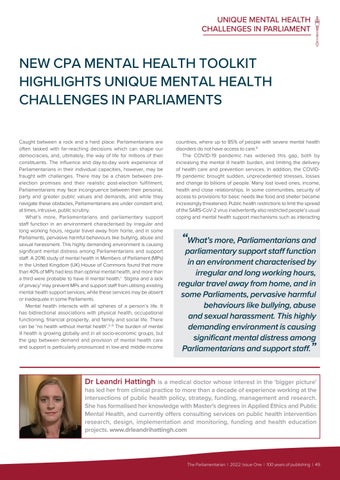UNIQUE MENTAL HEALTH CHALLENGES IN PARLIAMENT
NEW CPA MENTAL HEALTH TOOLKIT HIGHLIGHTS UNIQUE MENTAL HEALTH CHALLENGES IN PARLIAMENTS Caught between a rock and a hard place: Parliamentarians are often tasked with far-reaching decisions which can shape our democracies, and, ultimately, the way of life for millions of their constituents. The influence and day-to-day work experience of Parliamentarians in their individual capacities, however, may be fraught with challenges. There may be a chasm between preelection promises and their realistic post-election fulfillment, Parliamentarians may face incongruence between their personal, party and greater public values and demands, and while they navigate these obstacles, Parliamentarians are under constant and, at times, intrusive, public scrutiny. What’s more, Parliamentarians and parliamentary support staff function in an environment characterised by irregular and long working hours, regular travel away from home, and in some Parliaments, pervasive harmful behaviours like bullying, abuse and sexual harassment. This highly demanding environment is causing significant mental distress among Parliamentarians and support staff. A 2016 study of mental health in Members of Parliament (MPs) in the United Kingdom (UK) House of Commons found that more than 40% of MPs had less than optimal mental health, and more than a third were probable to have ill mental health.1 Stigma and a lack of privacy1 may prevent MPs and support staff from utilising existing mental health support services, while these services may be absent or inadequate in some Parliaments. Mental health interacts with all spheres of a person’s life. It has bidirectional associations with physical health, occupational functioning, financial prosperity, and family and social life. There can be ‘no health without mental health’.2–5 The burden of mental ill health is growing globally and in all socio-economic groups, but the gap between demand and provision of mental health care and support is particularly pronounced in low-and middle-income
countries, where up to 85% of people with severe mental health disorders do not have access to care.6 The COVID-19 pandemic has widened this gap, both by increasing the mental ill health burden, and limiting the delivery of health care and prevention services. In addition, the COVID19 pandemic brought sudden, unprecedented stresses, losses and change to billions of people. Many lost loved ones, income, health and close relationships. In some communities, security of access to provisions for basic needs like food and shelter became increasingly threatened. Public health restrictions to limit the spread of the SARS-CoV-2 virus inadvertently also restricted people’s usual coping and mental health support mechanisms such as interacting
“What’s more, Parliamentarians and
parliamentary support staff function in an environment characterised by irregular and long working hours, regular travel away from home, and in some Parliaments, pervasive harmful behaviours like bullying, abuse and sexual harassment. This highly demanding environment is causing significant mental distress among Parliamentarians and support staff.”
Dr Leandri Hattingh
is a medical doctor whose interest in the 'bigger picture' has led her from clinical practice to more than a decade of experience working at the intersections of public health policy, strategy, funding, management and research. She has formalised her knowledge with Master's degrees in Applied Ethics and Public Mental Health, and currently offers consulting services on public health intervention research, design, implementation and monitoring, funding and health education projects. www.drleandrihattingh.com
The Parliamentarian | 2022: Issue One | 100 years of publishing | 49



